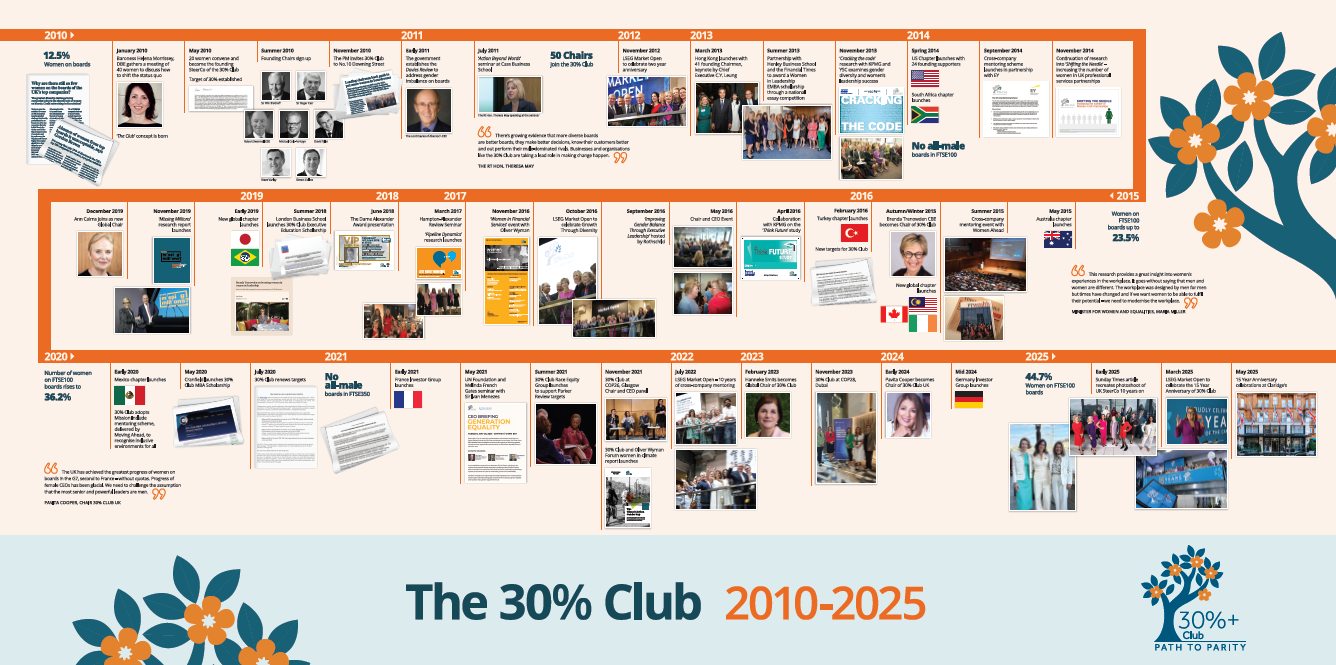From 12.5% to 44.7% – How a Bold Idea Sparked a Global Movement
When the 30% Club launched in 2010, just 12.5% of FTSE 100 board seats were held by women. That stark imbalance sparked the formation of a movement that set out to change the face of leadership, not just in the UK, but around the world.
Our new timeline marks the key milestones and turning points over the past 15 years, offering a visual reminder of what sustained advocacy, collaboration and courage can achieve. Click here to view the PDF in detail.

The Early Days (2010–2012)
The concept for the 30% Club was born in early 2010 when there were just 12.5% of women on FTSE 100 boards. Founding Chair Helena Morrissey brought together high-profile Chairs and CEOs who were willing to challenge the status quo, and a dedicated group of women to make up the first 30% Club SteerCo.
By 2012, the number of Chairs signing up to the 30% Club had grown to 50 – proving change was not only necessary, but possible.
Momentum Builds (2013–2016)
The 30% Club went global, with the 30% Club Hong Kong chapter launch. The club also turned its vision towards the pipeline and executive education with the launch of our first scholarship programme, in partnership with Henley Business School and the FT.
The UK saw a significant rise in women on boards during this time period, supported by initiatives like the “Cracking the Code” report and further international expansion into the US, Southern Africa, Ireland, Japan, Australia, Turkey, Canada, Ecuador and Malaysia.
By 2015, the percentage of women on UK boards had risen to 23.5%.
Making progress (2017–2020)
Research reports, mentoring initiatives, more scholarship programmes and CEO campaigns drove deeper change. The percentage of women on UK FTSE 100 boards rose to 36.2%
Accelerating Impact (2021–2024)
The Club hit a landmark moment – there were no all-male boards left in the FTSE 100. During these years, new campaigns, data releases and Chair-led working groups focused on building the pipeline of future leaders.
By the end of 2024, women made up 44.7% of FTSE 100 board roles, and the conversation has now shifted to how we can improve the number of women in executive leadership positions – to date only 9% of FTSE 100 companies have a woman in the CEO position.
2025 and Beyond: The Work Continues
Our focus in the UK now extends to the executive pipeline – ensuring women are not only present, but poised to lead at every level. As we head towards our 16th year, we’re doubling down on our mission to make inclusive leadership the norm, not the exception.

